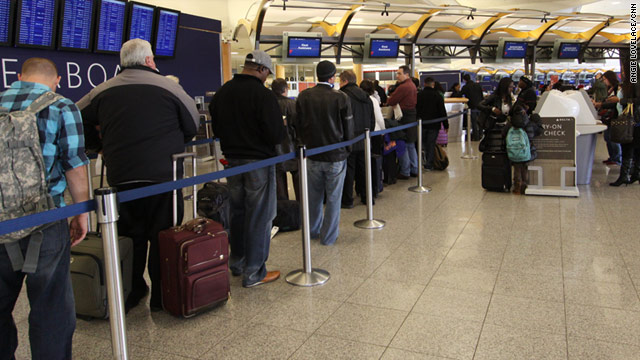Congressman wants passenger rights to become a law

- U.S. airlines will reach the billion-passenger-a-year mark in 2021, the FAA says
- A California congressman wants passenger rights to become law
- Airline industry group says tarmac delays are on the decline
Washington (CNN) -- Airlines in the United States will carry a billion passengers a year by 2021, the Federal Aviation Administration predicted Tuesday -- raising the prospect of even more flight delays and complaints from the flying public.
"That's why I'm introducing the Air Passenger Bill of Rights of 2011," Rep. Mike Thompson, D-California, announced Tuesday on Capitol Hill. "Many airlines have shown that they can't or won't put the needs of their passengers first."
Thompson's bill would make current passenger protections permanent and extend them to everyone flying into or out of the United States. It would require all airlines to provide water, food, working toilets, ventilation and the option for passengers to deplane if there is an extended delay.
The measure would include all carriers flying in or out of the country, including non-U.S.-based airlines.
It's the third time Thompson has introduced this legislation. The previous two bills failed to get off the ground.
The first measure was inspired by the incident four years ago today in which a JetBlue flight bound for Cancun, Mexico, sat on the tarmac at New York's John F. Kennedy International Airport for hours. Passengers received little to no information about the situation, they said.
"One of the pilots should get out here and have a mini-press conference," passenger Sarah Greenberg said in a phone call to CNN on February 15, 2007, as the plane sat on the tarmac. "The longer they wait, the more people are going to get upset. It's Psychology 101."
The plane was like a "sound-proofed coffin" when the windows were iced over, Carolyn Faucher, another stranded passenger, said at the time.
Even though Thompson's bill failed, many of the regulations in it were included in the Department of Transportation's "Enhancing Airline Passenger Protections" policy that went into effect in April 2010.
The major difference is that the Department of Transportation's policy only applies to U.S. domestic airlines flying within the United States. International flights by U.S.-based airlines can set their own rules and non-U.S. carriers are exempt.
The current policy mandates that the air carrier "provide adequate food and potable water no later than 2 hours after the aircraft leaves the gate...or touches down."
It also states that a passenger plane cannot remain on the tarmac for more than three hours, unless the pilot determines it is unsafe to move the aircraft. Airlines can face fines up to $27,500 dollars per incident if these rules are broken, but according to the FAA, no airlines have been fined since the new regulations started. The FAA says it's currently investigating 148 alleged violations of the three-hour tarmac rule.
The Air Transport Association, a trade group that represents the airline industry, tells CNN that a bill is "not needed" and that airlines are already complying with the three-hour tarmac rule. The ATA also says that in 2010, airlines experienced the lowest number ever of three-hour or longer tarmac delays.
The FAA predicts some 737 million passengers will board U.S. airlines in 2011.
Kate Hanni, founder of the passenger advocacy group Flyersrights.org, says before the Department of Transportation changed its rules, her organization received thousands of consumer complaints about tarmac delays on the group's hotline. After the rule change, she says, the phones stopped ringing.
"We went radio-silent on tarmac delays," she said.
Thompson and Hanni say legislation is needed to enforce passengers' rights, even though tarmac delays are on the decline, because the current regulations are not laws -- and regulations can be changed.
"Things are moving in the right direction, but it needs to be strengthened," Hanni said.
